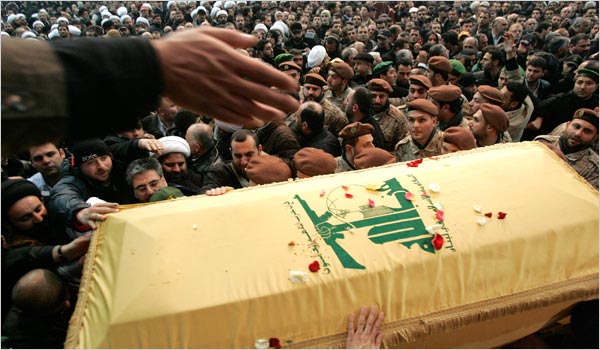 New York times, Robert F Worth, Imad Mugniyah was killed in a mysterious car bombing in the Syrian capital, Damascus, on Tuesday, a storm of accusation and counteraccusation quickly arose back here in Lebanon. Hezbollah, blamed Israel. Some Western-allied political figures blamed Syria. their own favorite nemesis. Still others saw the killing as the first part of a sinister deal between Syria, Israel and the United States, in which Lebanon would be the loser.
New York times, Robert F Worth, Imad Mugniyah was killed in a mysterious car bombing in the Syrian capital, Damascus, on Tuesday, a storm of accusation and counteraccusation quickly arose back here in Lebanon. Hezbollah, blamed Israel. Some Western-allied political figures blamed Syria. their own favorite nemesis. Still others saw the killing as the first part of a sinister deal between Syria, Israel and the United States, in which Lebanon would be the loser.
It is a familiar ritual in the Middle East, and especially here in divided Lebanon. No one here can point to any real evidence in the death of Mr. Mugniyah, a famously ruthless and elusive figure. No one has taken responsibility for killing him. But the accusations proliferate. And while they may look to outsiders like plausible explanations, they are often seen here as something different: a kind of road map to the accusers
Given the strong support of the United States and Europe for the tribunal, such a sellout seems far-fetched. But the identity of the Lebanese majority is rooted in fear of Syrian designs. Like Hezbollah with Israel, they are quick to invoke history to explain their sense of vulnerability.
In 1991, the United States, grateful for Syria’s support in the first Gulf War coalition, gave its tacit approval as the Syrian president Hafez al-Assad crushed his enemies in Lebanon and began a decade and a half of Syrian domination there.
Last November, some Lebanese feared a repeat of that episode after the United States invited Syria to a conference in Annapolis, Md., seeking an Israeli-Palestinian peace. They saw the invitation as the start of a deal to grant the Syrians control over Lebanon in exchange for help in resolving the Palestinian conflict.
In that case, the fears had real consequences. Leaders of the March 14 group made a sudden conciliatory gesture and agreed to accept a presidential candidate who had been favored by the Syrian-backed opposition.
But when Mr. Mugniyah was killed last week, fear was not their only response. Speaking to a vast crowd of supporters gathered in Martyrs’ Square on Thursday, Mr. Jumblatt reveled in the possibility that Syria and Hezbollah — his two major foes — were at each others’ throats.
“Look what happened yesterday,” he told the crowd. Syria and its allies in Hezbollah “are tearing each other apart,” he said. “They are eating each other.”



